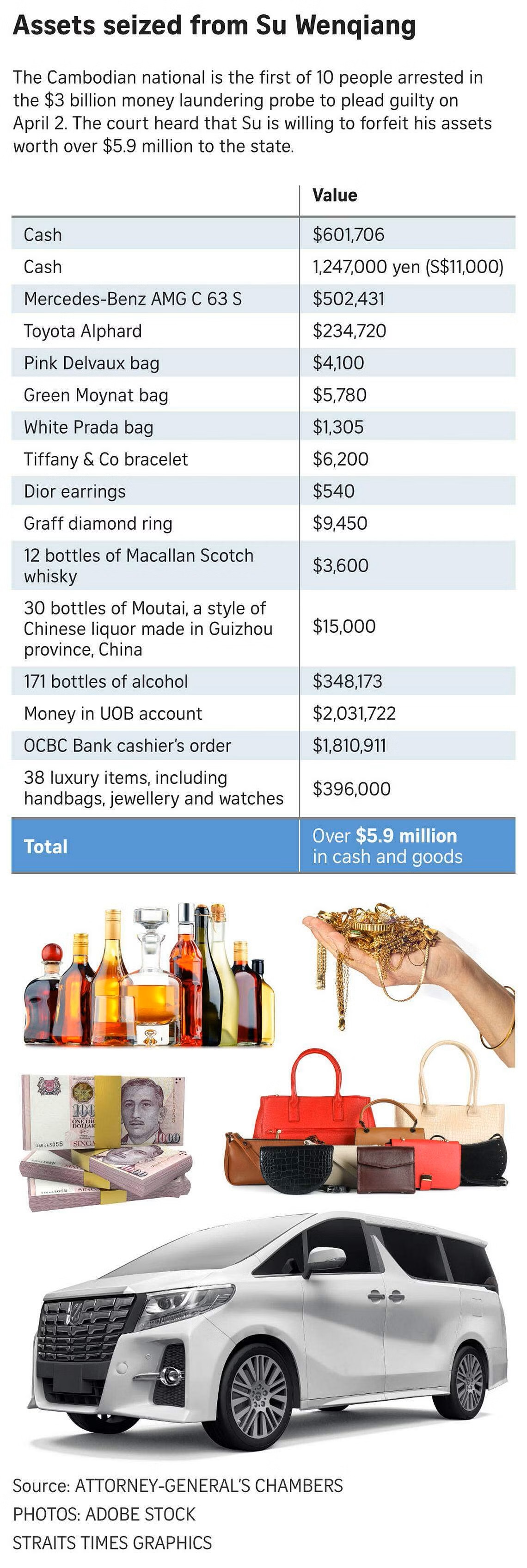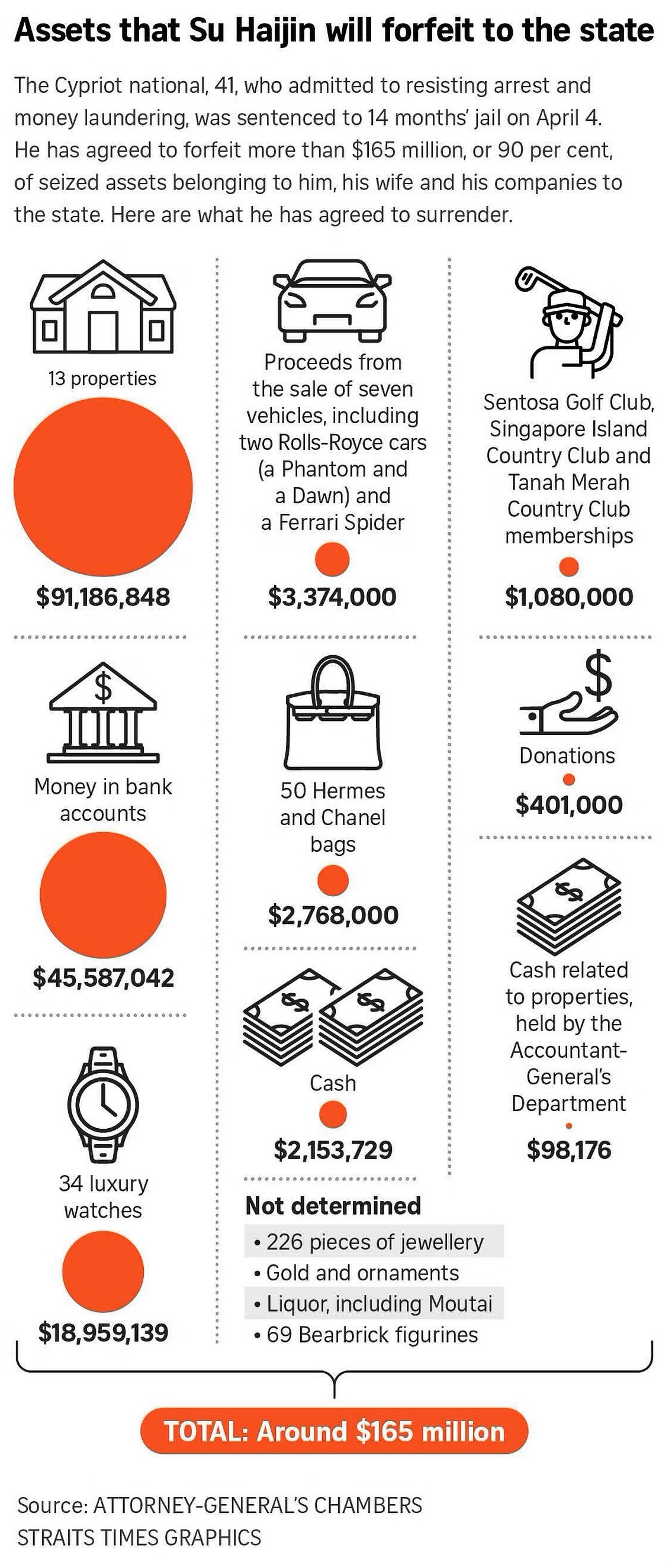What will happen to assets surrendered in $3b money laundering case?: askST
Source: Straits Times
Article Date: 07 Apr 2024
Author: Wong Shiying & Nadine Chua
Two men convicted in Singapore’s largest money laundering case surrendered more than $170 million worth of assets in total to the state, after they pleaded guilty earlier this week.
Two men convicted in Singapore’s largest money laundering case surrendered more than $170 million worth of assets in total to the state, after they pleaded guilty earlier this week.
Cambodian national Su Wenqiang forfeited assets worth over $5.9 million. He was sentenced to 13 months’ jail after admitting to two money laundering charges.
The 32-year-old is the first of 10 foreign nationals to be convicted over a probe, led by the Commercial Affairs Department (CAD), that saw more than $3 billion in cash and assets seized.
Cypriot national Su Haijin, 41, surrendered more than $165 million, or around 90 per cent of his assets.
He was sentenced to 14 months in jail after pleading guilty to a charge of resisting arrest and two counts of money laundering.
Both men, who are originally from China, will be deported after serving their jail terms and barred from re-entering Singapore.
As to which country they will be deported to, the Immigration and Checkpoints Authority said on April 4 that it will depend on “the admissibility of the foreigner based on his valid passport”.
1. What assets are the two men forfeiting to the state?
Su Wenqiang’s forfeited assets include more than $600,000 in cash, a Mercedes-Benz car worth around $500,000, a Toyota Alphard van worth over $230,000 and more than $2 million in a bank account.
Also among the items are luxury goods such as a Graff diamond ring, a pair of Dior earrings, a Tiffany & Co bracelet, a Moynat bag, a Prada bag and bottles of Macallan Scotch whisky.
Su Wenqiang’s defence lawyer Nandwani Manoj Prakash told the court on April 2 that the assets confiscated represent all his client’s earnings from an illegal gambling business based in the Philippines.

Su Haijin’s forfeited assets include 13 properties worth around $91 million, more than $45 million in bank accounts, and 69 Bearbricks, which are collectible toy figurines.
He also surrendered seven vehicles, including two Rolls-Royce cars. The vehicles have been sold by the authorities for over $3.3 million.
Other luxury items forfeited include nine luxury watches worth almost $19 million, Chanel and Hermes bags worth around $2.7 million and three country club memberships worth more than $1 million.

2. What will happen to the surrendered assets?
Lawyers told The Straits Times that a disposal inquiry will likely be held for the court to deal with any contesting claims to the assets, and to decide if the items will be destroyed or auctioned off.
If the assets are not contested, criminal lawyer Gino Hardial Singh from Abbots Chambers said they will likely be sold, as many of the items involved are highly valuable.
A police spokesman said that with the forfeiture order, non-cash assets may be sold through auctions.
The proceeds of the sale, along with forfeited cash, will then be paid into the Consolidated Fund, which is like a bank account held by the Government.
The revenues of Singapore are paid into this fund and out of which government expenditures are made.
Mr John Lim, managing director of LIMN Law Corporation, said members of the public can attend such auctions, adding that they will be subject to checks to ensure their funds come from legitimate sources.
Singapore Management University associate professor of law Eugene Tan said Chinese entities may make claims on the proceeds of the sale of the surrendered assets, as both Su Wenqiang and Su Haijin were found guilty of laundering proceeds from illegal online gambling businesses that targeted people in China.
He added: “The Singapore authorities may have to determine the rightful owners of the ill-gotten gains. This will be demanding, challenging and laborious since the sources of the illicit proceeds appear to be mostly outside Singapore.
“Cooperation with interested parties and the convicted persons is necessary for the administration of criminal assets.”
Senior criminal defence lawyer Rajan Supramaniam from Regent Law said it can take years for the authorities to trace the tainted funds and return them to their rightful owners.
3. Why were Su Haijin’s cars sold before the court decided how it will deal with the surrendered assets?
Mr Julian Tay from Lee & Lee, who represented Su Haijin, told ST that the CAD had suggested selling the cars. His client agreed to it.
The lawyer had explained in court on April 4 that selling the cars preserves their value, adding that it would also save the police the need to store and maintain the vehicles.
When asked if Su Haijin’s cars were financed by third parties like banks, Mr Tay said he is not aware of any car loans taken up by his client.
4. Where and how are the assets being kept?
Following the raid on Aug 15, 2023, the police took control of assets such as luxury bags and watches, and perishable items such as wine and whisky.
Mr Lim said the forfeited assets would be kept in a manner as to preserve their condition and value, pending the court’s decision on how they will be dealt with.
For luxury bags, for example, Mr Singh said they would need to be kept in a dry and cool environment to keep them from getting mouldy in Singapore’s humid climate.
He added that it would be in the police’s interest to dispose of or sell the assets as quickly as possible, as costs are incurred to store and maintain the items.
Source: Straits Times © SPH Media Limited. Permission required for reproduction.
2447